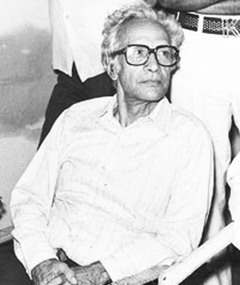| Version 2 (modified by , 13 years ago) (diff) |
|---|
Chetan Anand, (1915-97)
Hindi director, scenarist and actor; elder brother of Dev and Vijay Anand. Born in Lahore. Worked for the BBC and taught at the Doon School, Dehradun. Went to Bombay to act in Hindi films. Played the lead in the IPTA’s stage production of K.A. Abbas’s Zubeida directed by Balraj Sahni (1943). First film Neecha Nagar made in parallel with Abbas’s IPTA-backed Dharti Ke Lal (1946) and Uday Shankar’s Kalpana (1948) under government licence (required during WW2). Together with Dev Anand started Navketan Prod. (1949). Directed (and co-wrote with his ex-wife Uma) their début film, Afsar, adapted from Gogol’s The Government Inspector. With composer S.D. Burman and lyricist Sahir Ludhianvi, Navketan marked an influential transition of IPTA’s socialist realism into a brand of commercial Hindi cinema that drew from King Vidor, Capra, Huston and others to define a brief but crucial populist phase in Hindi films dealing with the working class (e.g. Taxi Driver). Influenced several cineastes such as Guru Dutt, Mohan Segal, Raj Khosla and Vijay Anand. Started his own Himalaya Films (1960). After the war film Haqeeqat, about the 1962 conflict with China, Anand remained the leading director associated with that genre, extending it into serial format for TV (Param Veer Chakra). His son, Ketan Anand, also became a director (Toote Khilone, 1978; Hum Rahe Na Hum, 1984).
FILMOGRAPHY (* also act): 1946: Neecha Nagar; 1950: Afsar; 1952: Aandhiyan; 1953: Humsafar (act only); 1954: Taxi Driver; 1955: Joru Ka Bhai; 1956: Funtoosh; 1957: Anjali*; 1960: Kala Bazaar (act only); 1963: Kinare Kinare*; 1964: Haqeeqat; 1966: Aakhri Khat; 1967: Aman (act only); 1970: Heer Ranjha; 1973: Hindustan Ki Kasam*; Hanste Zakhm; 1976: Jaaneman; 1977: Saheb Bahadur; 1981: Kudrat; 1985: Haathon Ki Lakeeren; 1988: Param Veer Chakra (TV).
Attachments
-
chetan.jpg
 (16.9 KB) -
added by 13 years ago.
(16.9 KB) -
added by 13 years ago.
